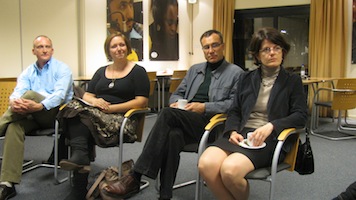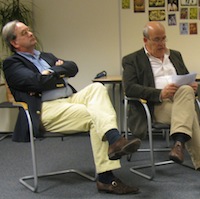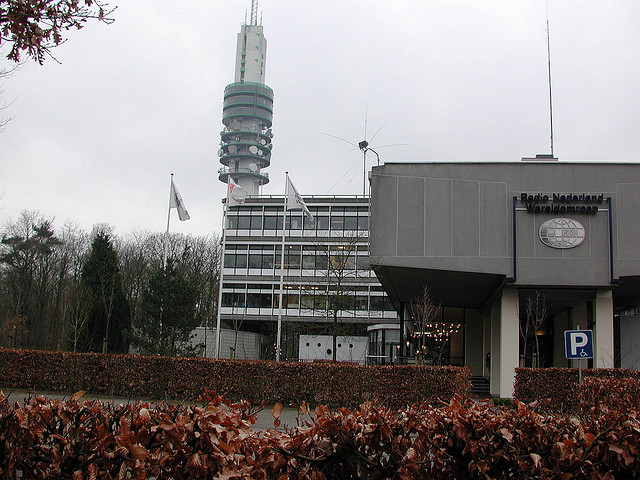On October 4th, members of the Ivy Circle community gathered at the headquarters of Radio Nederland Wereldomroep to discuss the difficult future facing the 60 year old institution. Faced with an almost 80% budget cut, how will the broadcaster reform itself to fit into a fast-changing world in uncertain times?
International broadcasting via shortwave started in the early part of the 20th century, when colonial powers like Britain and The Netherlands wanted to keep touch with their nationals abroad. It gained momentum during World War II and the cold war. Nation states on both sides found it an ideal way to get their news and propaganda across borders and ‘the iron curtain’. But with the ‘curtain’ torn down and internet and social media giving everyone a global say, is there a future for international broadcasting?

Members of the Ivy Circle heard the views of three Dutch government-financed media organizations that are all involved in promoting good journalism internationally. Not surprisingly, their answer was a resounding ‘yes!’ but government austerity, a very different political landscape and fast changing technology have meant a rethink of goals and approach.
Andy Clark, the head of the newsroom of Holland’s international service, Radio Netherlands Worldwide, explained that a budget cut announced this spring of nearly 80% and a narrowing of their mandate to “promoting freedom of speech” have meant a drastic restructuring. But in many ways, the process had already begun. Traditionally a shortwave broadcaster, RNW was an early adapter to internet, with live streaming, podcasts of programs, interactive blogs and an increasing emphasis on working with partner stations in Africa, Asia and Latin America. The Dutch-language department will end, now that Dutch expats have mostly easy access to domestic programs via computer or satellite; shortwave broadcasts will be phased out; and producers will work more closely with partner stations in select countries.

Peter Veenendaal, Manager of the Radio Netherlands Training Center, explained how for more than 40 years, this wing of Radio Netherlands had been organizing on average 3-6 courses a year for international journalists precisely to strengthen freedom of speech and good journalistic practice in countries with little experience of either. As technology has changed, courses have shifted on demand, placing much more emphasis now on multi-media skills. For RNTC and other Dutch institutions that cater to international students, shrinking government funds will mean finding other forms of sponsorship and providing some tailor-made courses for those who can afford to pay. But the demand for RNTC’s hands-on approach to journalism training is great, especially in poorer countries, and Mr. Veenendaal does not anticipate that RNTC will abandon journalists there.
Niels ten Oever from Free Press Unlimited, a recently merged triumvirate of three media support organizations, illustrated examples of their work on the ground in developing countries. Free Press Unlimited not only organizes training, it also provides technical and organizational support. For example, an effort to establish the first independent community radio station in Ethiopia was thwarted at every stage by government red tape, but with the Dutch NGO’s patient support, local people themselves came together and were able to overcome all the barriers. The station continues to thrive.
The presentations and discussion were organized and moderated by Fletcher School alumna Ginger da Silva, who worked for many years as a staff producer and network manager at RNW and more recently as a freelance course leader and trainer for both RNTC and Free Press Unlimited. It took place at RNTC and was followed by a tour of the Radio Netherlands newsroom and facilities.
